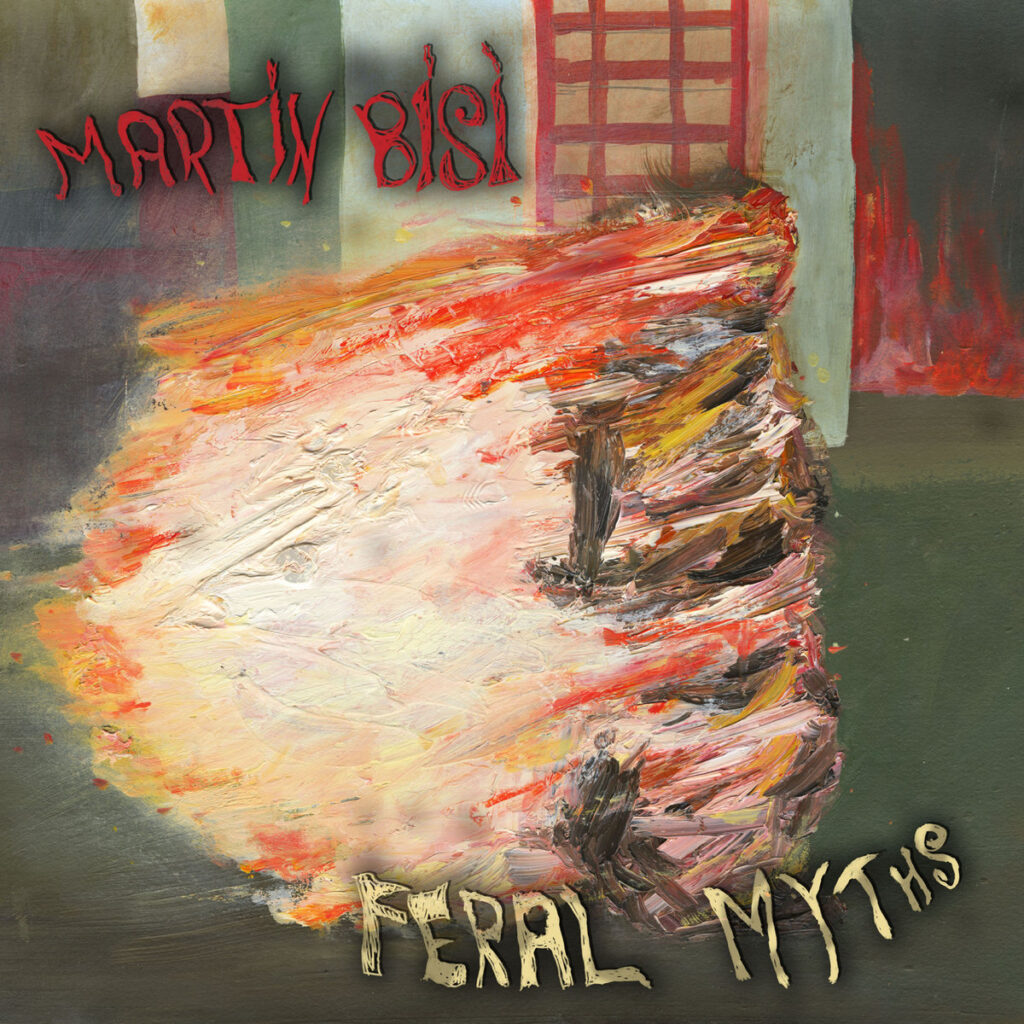
One of the great sonic innovators, Martin Bisi is not only an esteemed producer, having worked with Swans, Sonic Youth, Alice Donut and many more, but also a musician of no small renown, carving out an impressive niche for himself since 1988’s Creole Mass. Drawing on a range of influences, from jazz to Krautrock, Feral Myths has been quietly (and not so quietly) gestating since 2016, when a jam on his UK tour led to creation of the eight-minute closing track. That same spontaneity can be found across the record. As a matter of record, Bisi does not instruct his collaborators, allowing the music to emerge and evolve organically. It is only in production that he starts to martial the ideas into their final state, with the result that the album has a fly-on-the-wall feel that is all too rare in these days of intensive over-production
The album opens with The Octave Bridge, all squally synth and echoing vocals. A fair approximation of what would happen were Ciccone Youth to jam with the Swans, it is an eclectic and engaging introduction to the album. Yet, for all the chaos that swirls through the ether, there’s melody here too, hooking the listener and ensuring you’ll want to return. Next up, A Storm Called Ida is a beguiling mix of Arcade Fire-esque indie and hip hop nous, the sort of effortlessly cool and compelling sound collage that could only emerge from New York. Driven by emotion, it references the catastrophic storm of the titl, the damage of climate change and the greed of those buying land out from under people, and it is a mini-masterpiece. Those hip hop influences return in the scattered samples that pave the way into the sludgy noise rock of Silver Guardians. A strange piece that, in other hands, may have devolved into straightforward riffing, here guitars are left barely holding their tune, as massed vocals seep into the mix. On paper, it’s a muddle; in reality, it’s a brilliantly realised piece of music, almost certainly stitched together BC 35 style from various performances, that has an energy that is all its own. More direct, albeit still woozy and off kilter, is Mystery Of The Skin Suit, a track that draws on the hypnotic work of Great Annihilator-era Swans, adding Lydia Lunch inspired horror and eerie, overlapping vocals. So far, the album has proceeded along conventional paths, at least as far as a Bisi album is concerned. However, the pseudo-opera of Avian Invasions is a step into the unknown, sounding rather unlike anything I’ve ever heard before, although its closest relation arguably lies in the work of Lou Reed at his most obtuse.
Things head back towards the centre with the dark, post-rock haze of The Brain’s Riddle, a grinding nightmare that evokes the spirit of Confusion Is Sex, as layer upon layer of guitar slowly build to a tsunami of sound. It paves the way for the savage art-punk of Proud Boy 2 Way Mirror, which packs together the wrenching drone of a violin, hardcore riffing and track after track of disjointed vocals. It’s strangely compelling and, for all the digressions it takes along the way, a surprisingly visceral assault on the senses. The album ends with two epic length pieces, that allow a greater degree of space for Bisi’s sonic explorations. The first, which looks at the narrative of women winning throughout history, is entitled Esther Wins Again. A piece of dark, folk-infused ambiance, it references Stormy Daniels before widening its scope amidst the jangling guitars of Sister-era Sonic Youth. The album ends with the jam-derived The Great Trap In the Dark. A similarly expansive piece, it emerges from the sound of mangled synths and, with the addition of a discordant chorus, slowly seeks to eclipse the sun. A funereal mix of neo-classical and no wave, it feels like some long-lost collaboration between Gira and Branca, and it leaves a lasting impression upon the listener.
For over forty years, Martin Bisi has used his remarkable talents to explore the hinterlands of Americana. Elements of folk, jazz, hardcore and no wave all float through the mix in Feral Myths, and yet the album is remarkably accessible. Like The Whitey Album, The Great Annihilator, BC 35 or Sister, Bisi’s skill is in martialling disparate elements and ensuring a flow that seeks to engage rather than alienate. That’s not to say Feral Myths is an easy album, it is surely not for the mainstream and will likely find favour with a select few. However, Martin uses noise to expand the sonic palette of his music, always placing the song at the core of the experience, rather than noise for noise’s sake – an important lesson, that not every subsequent act has managed to successfully incorporate. For those who appreciate music as an experience, Feral Myths is a remarkable piece of work and a bold, expansive addition to Bisi’s catalogue. 9/10



